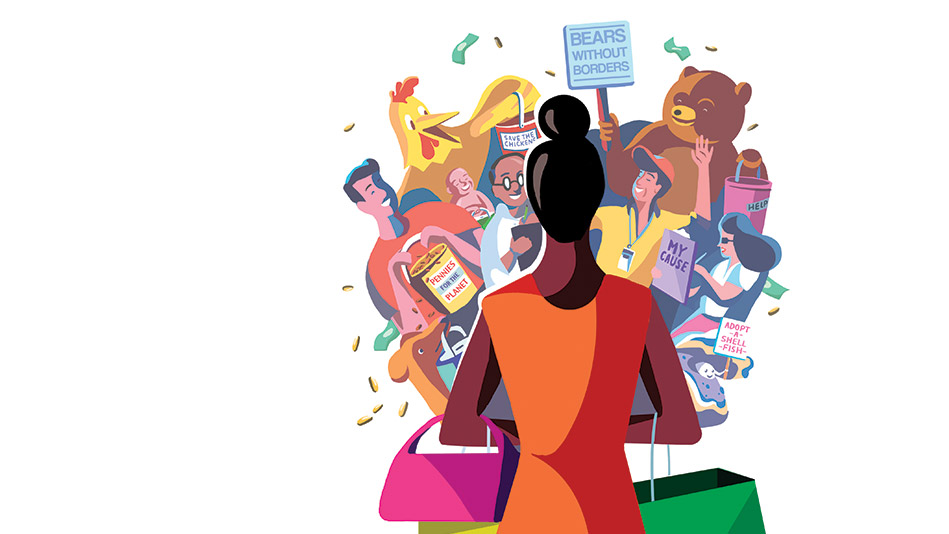The No-Regrets Approach to Donating Money

Illustration: Jack Hudson
Please note that I am not a financial adviser. My husband and I have not put away enough money for our two children to go to college. Our income is freelance. Our little Cape house could use a coat of paint. But we once saved enough from our beer-bottle and tax returns to write such a recklessly big check to the global wellness organization Partners in Health that they promptly sent us a handwritten invitation to a black-tie fundraising gala. Us, with our thrift-store jeans and library books, our camping holidays and baked-potato dinner parties. "Oh, my God," I said to my husband. "They think we're rich!" This struck us as hilarious. Until our daughter, with the uncanny, unapologetic wisdom of her 11 years, said, "Well, we are rich. I mean, compared to most of the world." And that, of course, is the point exactly. Clean water pours from our faucets; nourishing food fills our fridge; the children are vaccinated against catastrophic illnesses. Our wealth abounds. Ideally, at least in those ways, yours does, too.
Which means we get to be philanthropists! Even if you're having a bad year and you can give only $5, write the $5 check anyway. But first brainstorm a list of what matters most to you. Maybe it's world health. Or wildlife. Or eliminating urban poverty. Education. Politics. Public radio. Talk through the causes, research the related charitable organizations and decide how you want to invest in the best world you can imagine.
And remember that you can break your own rules. We gave money to our son's teacher, whose Guinean family has been hit hard by Ebola, even though our policy is to donate not to individuals but to organizations that know how to distribute aid in a crisis. But these are the ill parents and siblings of someone we know personally, and we can't help being touched by proximity. We also have a policy not to hand out money on the street, given that every dollar donated to our local food bank provides three meals a day for the needy—a more sensible investment. But then I hand out money on the street. Because people ask for it. Because they are ragged and hungry, or they have a new baby or an old dog, or they open a toothless mouth to call me "darling."
But also because it brings me joy. Oh, make sure your giving brings you joy. It's a contradiction, because circumstances can be so dire—and are: Roughly 1.2 billion people live below the international poverty line of $1.25 a day, and more than 17,000 children under age 5 die daily of avoidable diseases and malnutrition. To help chip away at that need is to experience your membership in the human community, your own courageous refusal to turn away from tragedy. Ask yourself, "Does my dog need pajamas more than someone needs access to clean water?" Buying stuff is the happiness equivalent of dropping your money into a puddle. Giving it away? That's pure sunshine.
Of course, there may come a day when you really want to clad your corgi in flannel, and so you will, and that will be okay. You needn't carve your privilege into a monument to guilt. You aren't Bill Gates. But an immoderately troubled world demands immoderate attention. An act of generosity just short of panic inducing—that's the sweet spot. Stretch toward it. Reach out your hand and open.
Which means we get to be philanthropists! Even if you're having a bad year and you can give only $5, write the $5 check anyway. But first brainstorm a list of what matters most to you. Maybe it's world health. Or wildlife. Or eliminating urban poverty. Education. Politics. Public radio. Talk through the causes, research the related charitable organizations and decide how you want to invest in the best world you can imagine.
And remember that you can break your own rules. We gave money to our son's teacher, whose Guinean family has been hit hard by Ebola, even though our policy is to donate not to individuals but to organizations that know how to distribute aid in a crisis. But these are the ill parents and siblings of someone we know personally, and we can't help being touched by proximity. We also have a policy not to hand out money on the street, given that every dollar donated to our local food bank provides three meals a day for the needy—a more sensible investment. But then I hand out money on the street. Because people ask for it. Because they are ragged and hungry, or they have a new baby or an old dog, or they open a toothless mouth to call me "darling."
But also because it brings me joy. Oh, make sure your giving brings you joy. It's a contradiction, because circumstances can be so dire—and are: Roughly 1.2 billion people live below the international poverty line of $1.25 a day, and more than 17,000 children under age 5 die daily of avoidable diseases and malnutrition. To help chip away at that need is to experience your membership in the human community, your own courageous refusal to turn away from tragedy. Ask yourself, "Does my dog need pajamas more than someone needs access to clean water?" Buying stuff is the happiness equivalent of dropping your money into a puddle. Giving it away? That's pure sunshine.
Of course, there may come a day when you really want to clad your corgi in flannel, and so you will, and that will be okay. You needn't carve your privilege into a monument to guilt. You aren't Bill Gates. But an immoderately troubled world demands immoderate attention. An act of generosity just short of panic inducing—that's the sweet spot. Stretch toward it. Reach out your hand and open.



